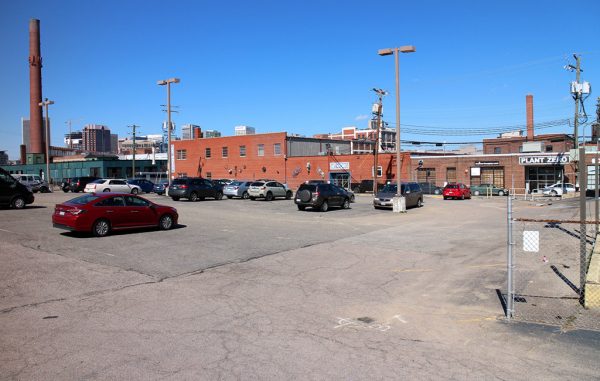
The surface parking lot between the Mayo Bridge and Commerce Road would be opened up to development. (Jonathan Spiers)
Development along Manchester’s Hull Street corridor is set to go higher and increase in density with a series of approvals by City Council this week.
Council voted to rezone the stretch of Hull between Cowardin Avenue and East Ninth Street to B-5 Central Business District, a zoning designation that was also updated to allow for more permitted uses.
The change to B-5 – suggested by city planning staff – increases the allowable building height for properties along that stretch from three or four stories to a maximum of five. It also reduces parking requirements, eliminating them entirely for commercial uses and for apartments, condos and hotels with less than 16 units.
A dozen properties along the east side of Hull between Commerce Street and the Mayo Bridge were rezoned to B-4 Central Business District, allowing for greater density and opening up surface parking lots there to potential development.
Local developer Tom Papa, who was among the property owners requesting that rezoning, said he doesn’t have specific plans in mind for the parking lots but wanted to follow the city’s lead in increasing density along Hull. The affected properties include 200, 214, 220, 320 and 400 Hull St., 15 E. Second St., 13 and 29 E. Third St., and 409, 501, 509 and 511 Decatur St.
Papa, whose Fountainhead Properties recently parted ways with longtime partner Rick Gregory, does have a plan for 1125 Commerce Road, a warehouse building that was rezoned to accommodate a conversion to more than 100 income-based apartments. City planning staff had not supported that change, but council members voted to approve the rezoning.
The 142,000-square-foot building currently houses Caritas Furniture Bank. The homeless services nonprofit plans to move to a 150,000-square-foot facility under development along Jefferson Davis Highway but is looking for temporary space to use before that facility’s projected opening in late 2019.
The nonprofit is searching for more than 40,000 square feet of warehouse space with up to 4,000 square feet of usable office or classroom space on site or in proximity. It also needs two or more loading docks and a location in walking distance to The Healing Place at 700 Dinwiddie Ave.

The surface parking lot between the Mayo Bridge and Commerce Road would be opened up to development. (Jonathan Spiers)
Development along Manchester’s Hull Street corridor is set to go higher and increase in density with a series of approvals by City Council this week.
Council voted to rezone the stretch of Hull between Cowardin Avenue and East Ninth Street to B-5 Central Business District, a zoning designation that was also updated to allow for more permitted uses.
The change to B-5 – suggested by city planning staff – increases the allowable building height for properties along that stretch from three or four stories to a maximum of five. It also reduces parking requirements, eliminating them entirely for commercial uses and for apartments, condos and hotels with less than 16 units.
A dozen properties along the east side of Hull between Commerce Street and the Mayo Bridge were rezoned to B-4 Central Business District, allowing for greater density and opening up surface parking lots there to potential development.
Local developer Tom Papa, who was among the property owners requesting that rezoning, said he doesn’t have specific plans in mind for the parking lots but wanted to follow the city’s lead in increasing density along Hull. The affected properties include 200, 214, 220, 320 and 400 Hull St., 15 E. Second St., 13 and 29 E. Third St., and 409, 501, 509 and 511 Decatur St.
Papa, whose Fountainhead Properties recently parted ways with longtime partner Rick Gregory, does have a plan for 1125 Commerce Road, a warehouse building that was rezoned to accommodate a conversion to more than 100 income-based apartments. City planning staff had not supported that change, but council members voted to approve the rezoning.
The 142,000-square-foot building currently houses Caritas Furniture Bank. The homeless services nonprofit plans to move to a 150,000-square-foot facility under development along Jefferson Davis Highway but is looking for temporary space to use before that facility’s projected opening in late 2019.
The nonprofit is searching for more than 40,000 square feet of warehouse space with up to 4,000 square feet of usable office or classroom space on site or in proximity. It also needs two or more loading docks and a location in walking distance to The Healing Place at 700 Dinwiddie Ave.


